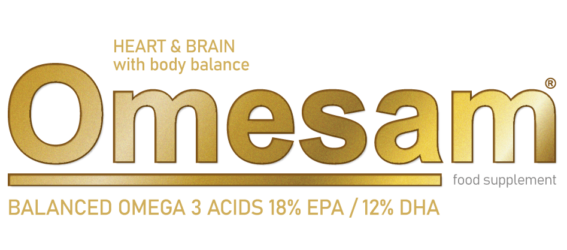Balanced Omega-3 formulation contained in OMESAM effectively protect your heart and blood vessels against disease states.
Advantages of Omega-3:
Omega-3 fatty acids, eicosapentaenoic acid – EPA and docosahexaenoic acid – DHA, have a beneficial effect on the cardiovascular system. DHA together with EPA control the level of triglycerides in the blood.
What are omega-3 fatty acids, and why are they good for your heart?
Omega-3 fatty acids are a type of unsaturated fatty acid that may reduce inflammation throughout the body. Inflammation in the body can damage your blood vessels and lead to heart disease and strokes.
Omega-3 fatty acids may benefit heart health by:
- Decreasing triglycerides
- Lowering blood pressure slightly
- Reducing blood clotting
- Decreasing your risk of strokes and heart failure risk
- Reducing irregular heartbeats
What Do Epidemiologic and Clinical Studies Show?
Large-scale epidemiologic studies suggest that people at risk for coronary heart disease (CHD) benefit from consuming omega-3 fatty acids from plants and marine sources. Evidence from prospective secondary prevention studies suggests that intakes of EPA+DHA ranging from 0.5 to 1.8 grams per day (either as fatty fish or supplements) significantly reduce the number of deaths from heart disease and all causes.
In randomized clinical trials (RCTs) that enrolled patients with coronary heart disease, omega-3 fatty acid supplements significantly reduced CV events (death, nonfatal heart attacks, nonfatal strokes). Omega-3 supplements can also slow the progression of atherosclerosis in these patients.
Mechanisms of Action
- decrease risk for arrhythmias, which can lead to sudden cardiac death.
- decrease risk for thrombosis, which can lead to heart attack and stroke.
- decrease triglyceride and remnant lipoprotein levels.
- decrease rate of growth of the atherosclerotic plaque.
- improve endothelial function.
- (slightly) lower blood pressure.
- reduce inflammatory responses.
AHA (American Heart Association) Recommendations
For patients with documented CHD, the AHA recommends ≈1 g of EPA and DHA (combined) per day.
An EPA+DHA supplement may be useful in patients with hypertriglyceridemia. Two to four grams of EPA+DHA per day can lower triglyceride 20% to 40%.

